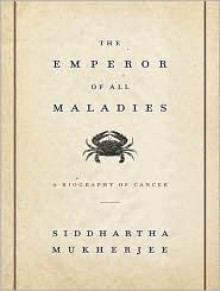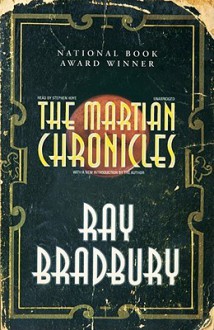

I can only stand cancer in fiction to a very limited degree. Too many childhood memories of my grandmother on my mom’s side and the lung cancer and treatments that eventually killed her. However, nonfiction books about diseases interest me, and I figured that nonfiction might have more distance and be less emotional than fiction. I needed an audiobook to listen to while I worked, and this one was long enough to keep me occupied for quite a while.
Considering my requirements, the beginning of this book was not promising. Mukherjee started off with the story of a patient of his, Carla - her initial odd illness and eventual cancer diagnosis. This was not the emotional distance I was looking for, and I ended up connecting to this first portion of the book more personally and painfully than I expected to. Almost a year and a half ago, I was diagnosed with chronic hepatitis C, and this early bit about Carla reminded me strongly of sitting with my hepatitis doctor and discussing what that diagnosis meant and what my choices were.
Thankfully, although he continued to touch on Carla and other patients’ stories throughout the book, Mukherjee soon turned to the overall science and history of cancer. It was fascinating and often horrifying. Since I listened to the audiobook version and didn’t take more than a couple scribbled notes while I was listening, I can’t give too many details about the sorts of topics he covered. What I'll do instead is write about the things that stuck with me.
In the back of my mind, I think I had the idea that cancer was a modern disease. Mukherjee discussed many of the misconceptions people have about cancer, and this was one of them. Just because people didn’t have the vocabulary to discuss it didn’t mean it didn’t exist. And, just because we call all sorts of cancers “cancer” doesn’t mean they’re all one monolithic disease.
The sections on attempts to cure cancer were often cringe-inducing. Although Mukherjee wrote about cancer treatment history from a physician’s perspective, my mind kept interjecting “patient’s perspective” horror. Early mastectomies performed without anesthesia. Radical mastectomies that seemed like a contest between surgeons, to see who could successfully remove the most tissue (and, in some cases, bone). I had to stop the book a few times, so that the images in my mind could dissipate.
And none of those horrors even guaranteed that the patients would remain cancer-free. Mukherjee discussed the discoveries that allowed scientists to better understand various cancers and try to develop treatments that could destroy cancer cells more directly and, hopefully, cause less lasting damage to the patients. One of the things I marveled at was how interconnected diseases and their treatments can be. Lessons learned from the treatment of cancer were applied to the treatment of AIDS and hepatitis B. I remembered seeing some of those same connections when I researched the drugs I was going to be on to treat my hepatitis C.
It felt like Mukherjee covered some of just about everything related to cancer: its history, its science, its treatment, the people who studied it and raised money to research it, the politics surrounding it. For the most part, he explained things in a clear and easy-to-understand way, although I admit I got a little lost during some of the parts near the end on proteins and genetics. I was only really aware of how long the book was during the last three or so discs, which I felt dragged a little.
I’m not sure I could call this a reassuring read, but it was, overall, fascinating and incredibly informative.
(Original review, with read-alikes, posted on A Library Girl's Familiar Diversions.)
 The impact of this one built with each chapter. I didn't get far in my first attempt at this book years ago. The style is Hemingwayesque. Spare prose, mostly simple sentence structure, repetitive phrasing, a rather staccato rhythm. I felt on first read that it was too dry, too much like a novelized narrative history. In essence, that is what this novel of the turning point battle in the American Civil War--Gettysburg--is about. However, the battle scenes are rendered more clearly than I can ever remember reading in military fiction or non-fiction and the drama makes all the more impact because of the restraint of the prose. Each of the four sections covers a day--the day before the battle, the first day, the second day, the third and last. Within the sections are chapters named after the primary character, although the novel is omniscient throughout, often giving an eagle-eye view or briefly entering the mind of other characters.
The viewpoint is mostly neutral, but tilted somewhat to the Confederacy, with a dozen chapters devoted to characters on that side compared to ten to the Union side. Robert E. Lee is presented very sympathetically, and we're told he "does not own slaves nor believe in slavery." (I've read historical accounts and watched documentaries that dispute both points.) To me though the character on the Southern side that stood out is General James Longstreet, who opposed Lee's strategy and felt his decisions cost them the battle and war. There's a poignancy in this man determined to do his duty despite believing they were headed to disaster, and that in invading the North he and Lee had broken their oath taken as American officers to protect and defend this soil. I certainly learned much about the officers on that side of the conflict to win them my grudging sympathy (grudging, because I don't sympathize with the Confederate cause.) There is Pickett, of Pickett's charge, who was a personal friend of Abraham Lincoln. And there's Lewis Armistead whose best friend, Winfield Scott Hancock, fought at Gettysburg on the other side. Colonel Lawrence Chamberlain of Maine is the officer that largely gives voice to the Union side, who comes closest to giving us a soldier's view of battle as he fights with his men to hold a crucial hill. He's the man who gives the novel its title. He once quoted to his father, Hamlet's lines on "what a work is man...in action how like an angel." A "murdering angel" is how his father responded.
In the character of a British observer, Fremantle, we're able to see the possible impact of a Confederate victory. Northern and Southern, maybe a Western American nation armed and contending against each other for territory. Perhaps Britain entering on behalf of the South if those states would return to the empire--a vastly different history might have resulted. On the other hand, reading Longstreet makes you understand why defeat for the South might have been inevitable from the start. The book made me feel the weight and contingency of a few days that made all the difference to the United States.
The impact of this one built with each chapter. I didn't get far in my first attempt at this book years ago. The style is Hemingwayesque. Spare prose, mostly simple sentence structure, repetitive phrasing, a rather staccato rhythm. I felt on first read that it was too dry, too much like a novelized narrative history. In essence, that is what this novel of the turning point battle in the American Civil War--Gettysburg--is about. However, the battle scenes are rendered more clearly than I can ever remember reading in military fiction or non-fiction and the drama makes all the more impact because of the restraint of the prose. Each of the four sections covers a day--the day before the battle, the first day, the second day, the third and last. Within the sections are chapters named after the primary character, although the novel is omniscient throughout, often giving an eagle-eye view or briefly entering the mind of other characters.
The viewpoint is mostly neutral, but tilted somewhat to the Confederacy, with a dozen chapters devoted to characters on that side compared to ten to the Union side. Robert E. Lee is presented very sympathetically, and we're told he "does not own slaves nor believe in slavery." (I've read historical accounts and watched documentaries that dispute both points.) To me though the character on the Southern side that stood out is General James Longstreet, who opposed Lee's strategy and felt his decisions cost them the battle and war. There's a poignancy in this man determined to do his duty despite believing they were headed to disaster, and that in invading the North he and Lee had broken their oath taken as American officers to protect and defend this soil. I certainly learned much about the officers on that side of the conflict to win them my grudging sympathy (grudging, because I don't sympathize with the Confederate cause.) There is Pickett, of Pickett's charge, who was a personal friend of Abraham Lincoln. And there's Lewis Armistead whose best friend, Winfield Scott Hancock, fought at Gettysburg on the other side. Colonel Lawrence Chamberlain of Maine is the officer that largely gives voice to the Union side, who comes closest to giving us a soldier's view of battle as he fights with his men to hold a crucial hill. He's the man who gives the novel its title. He once quoted to his father, Hamlet's lines on "what a work is man...in action how like an angel." A "murdering angel" is how his father responded.
In the character of a British observer, Fremantle, we're able to see the possible impact of a Confederate victory. Northern and Southern, maybe a Western American nation armed and contending against each other for territory. Perhaps Britain entering on behalf of the South if those states would return to the empire--a vastly different history might have resulted. On the other hand, reading Longstreet makes you understand why defeat for the South might have been inevitable from the start. The book made me feel the weight and contingency of a few days that made all the difference to the United States.
 Beautifully written, you can see Bradbury stretching his skill here. It is pretty amazing to think that this was written more than 60 years ago. It is definitely a product of its time with all the pipe smoking and "Golly, gee" dialogue. Still, as a characterization of the post-war attitudes of progress and destruction, it is a pretty good window into the American psyche of its time.
Beautifully written, you can see Bradbury stretching his skill here. It is pretty amazing to think that this was written more than 60 years ago. It is definitely a product of its time with all the pipe smoking and "Golly, gee" dialogue. Still, as a characterization of the post-war attitudes of progress and destruction, it is a pretty good window into the American psyche of its time.